
 |
||||||
|
GAY
FILM REVIEWS BY MICHAEL D. KLEMM
|
||||||
|
Kiss Of The Spider Woman City
Lights Media Group, Director:
Screenplay:
Starring:
Rated R, 120 minutes |
Movies
& Marxism
It took a long time for Kiss Of The Spider Woman to finally come out on DVD but it was worth the wait. Seeing this outstanding film again, digitally remastered in its original widescreen format, was a pure delight. Kiss Of The Spider Woman broke a lot of ground back in 1985. Aside from its plot, which was hardly 1980s multiplex fodder, the film took top honors at Cannes, it was the first independent film to be nominated for all of the big Oscars and William Hurt became the first man to win Best Actor for playing a homosexual. (A few years later, Tom Hanks would bag the same award for Philadelphia, a few years after that Hilary Swank won for Boys Don't Cry - spawning the joke that the surest way to win Best Actor is to play a mentally challenged person or a homosexual; Hanks won for both.) Spider Woman's influence was so great that it would also become a Tony Award winning Broadway musical by Kander & Ebb with Chita Rivera and Brent Carver. |
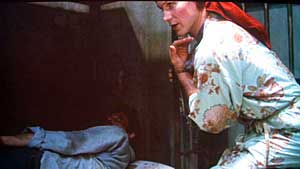 THE
FILM THE
FILMKiss Of The Spider Woman takes place in an un-named, fascist country in South America. It is, essentially, a two-actor drama featuring two men, of vastly different demeanors and ideologies, who share the same cell in a brutal prison. Louis Molina (William Hurt) is a flamboyant homosexual window dresser who is imprisoned for corrupting a minor. His cellmate is Valentin Arregui (Raul Julia), a journalist jailed for his leftist political activities. To alleviate the day-to-day drudgery, Molina entertains Valentin by retelling the stories of his favorite movies. |
|
|
|
|
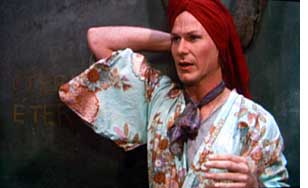 The
film begins, not unlike Un
Chant d'Amour (Jean Genet's classic, homoerotic, 1950 prison short),
with the camera fixed on the wall of their jailhouse cell. We hear Molina's
voice, rapturously describing the star of his movie. "She's not a woman
like all the others," he utters, along with the assertion that she is waiting
for a "real man" like none she has ever met before. A circular camera pan
slowly reveals the setting; we see the prison bars, a clothesline with feminine
garments, pictures of glamorous movie stars on the wall, and finally Molina
- wrapping a towel around his head to suggest a turban. He is dressed in
a kimono, his feet, lady-like, step gracefully across the floor as he mimes
the heroine stepping into her bath. Molina is exotic and sensual, and completely
out of place in the grim prison setting. The
film begins, not unlike Un
Chant d'Amour (Jean Genet's classic, homoerotic, 1950 prison short),
with the camera fixed on the wall of their jailhouse cell. We hear Molina's
voice, rapturously describing the star of his movie. "She's not a woman
like all the others," he utters, along with the assertion that she is waiting
for a "real man" like none she has ever met before. A circular camera pan
slowly reveals the setting; we see the prison bars, a clothesline with feminine
garments, pictures of glamorous movie stars on the wall, and finally Molina
- wrapping a towel around his head to suggest a turban. He is dressed in
a kimono, his feet, lady-like, step gracefully across the floor as he mimes
the heroine stepping into her bath. Molina is exotic and sensual, and completely
out of place in the grim prison setting. |
|
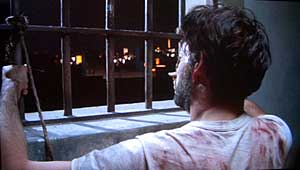 His
cellmate, Valentin, is masculinity personified. He is rugged, his face is
bearded, he shows the scars of his interrogations. He is obsessed with revolution;
he might as well be Che Guevara. A man like Valentin would find a man like
Molina to be ineffectual and ridiculous, but he listens to his cellmate's
movie to pass the time. It soon becomes apparent to Valentin that the romantic
melodrama Molina describes is, in fact, an old Nazi propaganda film. But
Molina isn't concerned with the movie's politics; all he sees are two dazzling
and beautiful people in love on a big screen. "I embroider a little," Molina
croons, "So you can see the movie like I do." He responds to Valentin's
taunts that "fantasy is no escape" by saying "If you've got the keys to
that door, I will gladly follow. Otherwise, I will escape in my own way."
Valentin snaps back, "Then your life is as trivial as your movies." His
cellmate, Valentin, is masculinity personified. He is rugged, his face is
bearded, he shows the scars of his interrogations. He is obsessed with revolution;
he might as well be Che Guevara. A man like Valentin would find a man like
Molina to be ineffectual and ridiculous, but he listens to his cellmate's
movie to pass the time. It soon becomes apparent to Valentin that the romantic
melodrama Molina describes is, in fact, an old Nazi propaganda film. But
Molina isn't concerned with the movie's politics; all he sees are two dazzling
and beautiful people in love on a big screen. "I embroider a little," Molina
croons, "So you can see the movie like I do." He responds to Valentin's
taunts that "fantasy is no escape" by saying "If you've got the keys to
that door, I will gladly follow. Otherwise, I will escape in my own way."
Valentin snaps back, "Then your life is as trivial as your movies." |
|
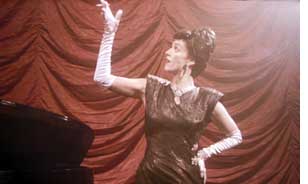 Molina's
descriptions of the movie are accompanied by lushly filmed, sepia toned
images that stand out in contrast against the gray prison photography. This
film within a film is beautifully realized kitsch. Everything about it is
a cliche-fest from the plot to the deliberately hammy acting; but substance
be damned, everything about it is fabulous. We are seeing this "trivial"
film through Molina's eyes as he fulfills the role that many gay men played
throughout history; identifying with the glamorous leading lady, the downtrodden
female. Molina's
descriptions of the movie are accompanied by lushly filmed, sepia toned
images that stand out in contrast against the gray prison photography. This
film within a film is beautifully realized kitsch. Everything about it is
a cliche-fest from the plot to the deliberately hammy acting; but substance
be damned, everything about it is fabulous. We are seeing this "trivial"
film through Molina's eyes as he fulfills the role that many gay men played
throughout history; identifying with the glamorous leading lady, the downtrodden
female. |
|
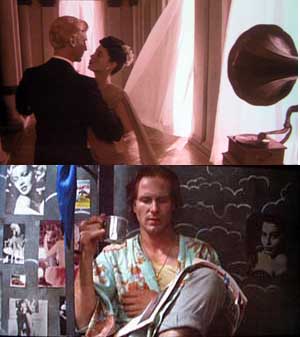 Molina
will test Valentin's patience but he will also break through the Leftist's
armor. As they grow closer, Valentin is able to see that Molina, a homosexual,
is another oppressed victim of Big Brother's regime. They find common ground
because both are enemies of the state, even if for very different reasons.
Still, when angered, he calls Molina a faggot, tells him to "be a man,"
and then finds his pre-conceived notions of masculinity challenged again
and again. Molina undergoes his own transformation when he is forced to
look below the surface as Valentin violently reminds him that the Nazis
who made his romanticized film also shoved Jews, Marxists and homosexuals
into the ovens. But spinning the movie's tale benefits both of them as each
is a Romantic in his own way; for Molina it's a silver screen goddess, for
Valentin it's the idea of revolution. Molina
will test Valentin's patience but he will also break through the Leftist's
armor. As they grow closer, Valentin is able to see that Molina, a homosexual,
is another oppressed victim of Big Brother's regime. They find common ground
because both are enemies of the state, even if for very different reasons.
Still, when angered, he calls Molina a faggot, tells him to "be a man,"
and then finds his pre-conceived notions of masculinity challenged again
and again. Molina undergoes his own transformation when he is forced to
look below the surface as Valentin violently reminds him that the Nazis
who made his romanticized film also shoved Jews, Marxists and homosexuals
into the ovens. But spinning the movie's tale benefits both of them as each
is a Romantic in his own way; for Molina it's a silver screen goddess, for
Valentin it's the idea of revolution. |
|
 Valentin
finds that he's not immune to fantasy's lure. He will admit to Molina that,
when he was being tortured, the only thing that saved him was thinking about
Marta. The idealized Marta is a good example of the layers and the depth
that original novelist Manuel Puig gave to his characters. The one woman
that this child of the revolution loved was "upper class, pure Bourgeois,"
and he feels like a hypocrite because of it. We will see her in flashback,
she is played by Sonia Braga.
The same actress also plays the heroine in the Nazi film and the Spider
Woman in Molina's final tale - blurring further the line between fantasy
and reality. Valentin
finds that he's not immune to fantasy's lure. He will admit to Molina that,
when he was being tortured, the only thing that saved him was thinking about
Marta. The idealized Marta is a good example of the layers and the depth
that original novelist Manuel Puig gave to his characters. The one woman
that this child of the revolution loved was "upper class, pure Bourgeois,"
and he feels like a hypocrite because of it. We will see her in flashback,
she is played by Sonia Braga.
The same actress also plays the heroine in the Nazi film and the Spider
Woman in Molina's final tale - blurring further the line between fantasy
and reality. |
|
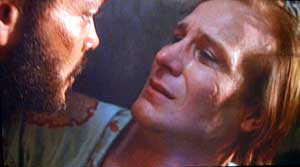 The
lines between masculine and feminine are blurred as well. Look at their
names; which of the two sounds more like a woman's name? The questions of
what makes a man weave throughout the film. "I take it like a woman. Always."
Molina tells Valentin; he wants a "real man" to take control. Valentin,
who believes in the equality of women, cannot accept this and he tells Molina
that "what really makes a man has to do with not humiliating anybody. It's
not letting the people around you feel degraded." Molina embraces his role
as a woman, and as a victim, while Valentin angrily asks "What's this
between your legs?" But, at times, Molina proves stronger than his revolutionary
comrade. It is Valentin who, after being poisoned by the prison food, cries
when he soils himself. He feels humiliation, and then gratitude, as Molina
cleans him up. This is a love story like no other and it is, at its
core, a love story. The
lines between masculine and feminine are blurred as well. Look at their
names; which of the two sounds more like a woman's name? The questions of
what makes a man weave throughout the film. "I take it like a woman. Always."
Molina tells Valentin; he wants a "real man" to take control. Valentin,
who believes in the equality of women, cannot accept this and he tells Molina
that "what really makes a man has to do with not humiliating anybody. It's
not letting the people around you feel degraded." Molina embraces his role
as a woman, and as a victim, while Valentin angrily asks "What's this
between your legs?" But, at times, Molina proves stronger than his revolutionary
comrade. It is Valentin who, after being poisoned by the prison food, cries
when he soils himself. He feels humiliation, and then gratitude, as Molina
cleans him up. This is a love story like no other and it is, at its
core, a love story. |
|
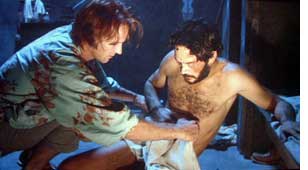 Kiss
Of The Spider Woman
is an amazing film. Gritty and realistic, some of the prison scenes are
the stuff of nightmares. Director Hector Babenco had previously filmed 1981's
Pixote, a dark story about street kids. The cinematography deftly
exploits the claustrophobic confinement in the geography of their cell.
The contrast of the prison and the old movie clips is one of the ways in
which the film remains visually arresting throughout. Hurt and Julia have
a marvelous chemistry as Molina and Valentin; their scenes together on screen
are pure magic. Some have called Hurt's acting over-the-top but I disagree.
(Puig said that Hurt was so bad that he would probably win an Oscar.) His
humanity is always there beneath the artifice and his performance is heartbreaking.
The late Raul Julia is also unforgettable as Valentin. Kiss
Of The Spider Woman
is an amazing film. Gritty and realistic, some of the prison scenes are
the stuff of nightmares. Director Hector Babenco had previously filmed 1981's
Pixote, a dark story about street kids. The cinematography deftly
exploits the claustrophobic confinement in the geography of their cell.
The contrast of the prison and the old movie clips is one of the ways in
which the film remains visually arresting throughout. Hurt and Julia have
a marvelous chemistry as Molina and Valentin; their scenes together on screen
are pure magic. Some have called Hurt's acting over-the-top but I disagree.
(Puig said that Hurt was so bad that he would probably win an Oscar.) His
humanity is always there beneath the artifice and his performance is heartbreaking.
The late Raul Julia is also unforgettable as Valentin. |
|
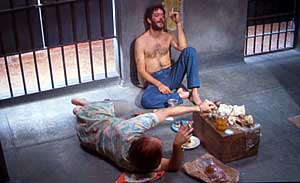 The
film version is, in many ways, more accessible than the original novel.
The film is more tightly constructed because Molina tells the stories of
several different movies in the book, beginning with Val Lewton's classic
1942 Cat People. Only one of these films was emphasized in the movie
and that was the Nazi film, whose central theme of betrayal mirrors Molina
and Valentin's situation, making Spider Woman
a model of effective film adaptation. To be honest, it's
easy to lose interest in Molina's long monologues when reading the book;
in the film his monologues come to life when illustrated by those campy
clips. The
film version is, in many ways, more accessible than the original novel.
The film is more tightly constructed because Molina tells the stories of
several different movies in the book, beginning with Val Lewton's classic
1942 Cat People. Only one of these films was emphasized in the movie
and that was the Nazi film, whose central theme of betrayal mirrors Molina
and Valentin's situation, making Spider Woman
a model of effective film adaptation. To be honest, it's
easy to lose interest in Molina's long monologues when reading the book;
in the film his monologues come to life when illustrated by those campy
clips. |
|
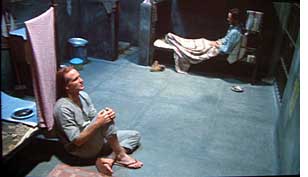 THE
DVD THE
DVD The disc sports a fine widescreen transfer and has never looked better. After you watch all the extras on the second disc you will certainly know everything that always wanted to know about the film. The 2 hour documentary on the making of Spider Woman is very thorough; so thorough that it's a bit like reading Moby Dick where you get to find out everything you never wanted to know about whales. Don't get me wrong, it's a great documentary. It's just that it could easily lose a half hour. Most of us are not interested in learning every detail of how the money was raised, or how the director stunk up the editing room with his cigars. |
|
 On
the other hand, it was interesting to learn that Burt Lancaster originally
wanted to play the part of Molina. I can't picture it for the life of me
but the idea fascinates all the same. I thought it was cute that Manuel
Puig was on the set of the Nazi film-within-a-film to coach Sonia Braga's
gestures as she grandly overplayed the heroine. We also learn that a potential
disaster actually aided the finished film. The filmmakers were unable to
secure the rights to use Cat People, even though screenwriter Leonard
Schrader's brother had just re-made the film with Nastassia Kinski. This
was a blessing in disguise because, as noted above, eliminating the others
and utilizing only the Nazi film for Molina's stories resulted in a tighter
and more focused film. On
the other hand, it was interesting to learn that Burt Lancaster originally
wanted to play the part of Molina. I can't picture it for the life of me
but the idea fascinates all the same. I thought it was cute that Manuel
Puig was on the set of the Nazi film-within-a-film to coach Sonia Braga's
gestures as she grandly overplayed the heroine. We also learn that a potential
disaster actually aided the finished film. The filmmakers were unable to
secure the rights to use Cat People, even though screenwriter Leonard
Schrader's brother had just re-made the film with Nastassia Kinski. This
was a blessing in disguise because, as noted above, eliminating the others
and utilizing only the Nazi film for Molina's stories resulted in a tighter
and more focused film. |
|
|
|
|
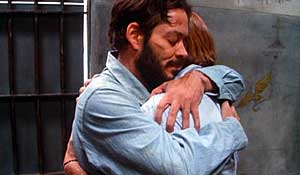 Vito
Russo was very critical of Kiss Of The
Spider Woman in The Celluloid Closet and so were many
other queer reviewers. Most of their criticisms however aren't valid unless,
like them, you refuse to see the film as anything but just another
portrayal of a stereotypical screaming queen who dies in the last reel.
Yes, Molina does die at the end, in much the same way as the heroine
of the Nazi film, but it is all too probable that he won't be alone and
that Valentin will share the same fate. For that reason, it's unfair to
lump Spider Woman in the same
category as an overblown, homophobic melodrama like Reflections In A
Golden Eye. Besides, don't most of Shakespeare's leading men bite the
dust in the last act too? I see no possible way for this film to end happily,
and so let us instead examine the transformation that happens between the
two men, Vito
Russo was very critical of Kiss Of The
Spider Woman in The Celluloid Closet and so were many
other queer reviewers. Most of their criticisms however aren't valid unless,
like them, you refuse to see the film as anything but just another
portrayal of a stereotypical screaming queen who dies in the last reel.
Yes, Molina does die at the end, in much the same way as the heroine
of the Nazi film, but it is all too probable that he won't be alone and
that Valentin will share the same fate. For that reason, it's unfair to
lump Spider Woman in the same
category as an overblown, homophobic melodrama like Reflections In A
Golden Eye. Besides, don't most of Shakespeare's leading men bite the
dust in the last act too? I see no possible way for this film to end happily,
and so let us instead examine the transformation that happens between the
two men, |
|
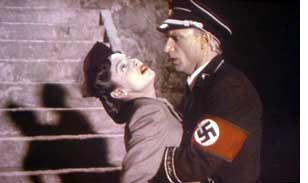 Valentin's
opinion of Molina changes drastically. He is no longer a silly faggot in
his eyes but a man whose sense of dignity is equal to his own. Valentin
will even make love to Molina, his notions of what traditionally defines
a man shattered forever. It is possible that his only reason for doing this
was to convince Molina to take a message to the Resistance, but it is also
apparent that his newfound respect, and even his love, for his cellmate
is genuine. "Promise me," Valentin ultimately says, "You won't let anyone
exploit you again. No one has the right to do that to anyone." Molina's
motives are far more complicated than first thought when we discover, at
the film's mid-point, that he is actually spying on Valentin in exchange
for an early parole. This revelation pulls the rug out from under the audience
but, like Molina's beloved screen heroine, he essentially becomes a double
agent. Molina has fallen in love with his cellmate; he gives no information
to his captors. He agrees to help Valentin on the outside and his sudden
political involvement proves fatal. If John Wayne were watching the film,
he would probably subscribe to the quaint idea that this sacrifice finally
makes Molina a "man." Valentin's
opinion of Molina changes drastically. He is no longer a silly faggot in
his eyes but a man whose sense of dignity is equal to his own. Valentin
will even make love to Molina, his notions of what traditionally defines
a man shattered forever. It is possible that his only reason for doing this
was to convince Molina to take a message to the Resistance, but it is also
apparent that his newfound respect, and even his love, for his cellmate
is genuine. "Promise me," Valentin ultimately says, "You won't let anyone
exploit you again. No one has the right to do that to anyone." Molina's
motives are far more complicated than first thought when we discover, at
the film's mid-point, that he is actually spying on Valentin in exchange
for an early parole. This revelation pulls the rug out from under the audience
but, like Molina's beloved screen heroine, he essentially becomes a double
agent. Molina has fallen in love with his cellmate; he gives no information
to his captors. He agrees to help Valentin on the outside and his sudden
political involvement proves fatal. If John Wayne were watching the film,
he would probably subscribe to the quaint idea that this sacrifice finally
makes Molina a "man." |
|
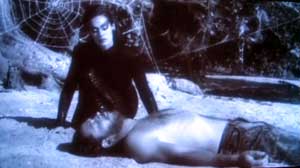 If
that is the case, what of Valentin? He learns that it isn't wrong, or weak,
to embrace what he once rejected as trivial. At the end, the revolutionary
is the infirmary after having been beaten and almost tortured to death.
After an orderly risks his job by giving him morphine, Valentin remembers
Molina's lessons and he escapes into fantasy. Marta appears and they run
out of the prison, hand in hand, until they are together - in glimmering
black and white - on the Spider Woman's island and the film ends much like
Un Chant d'Amour
did, with an escape from brutal reality into daydreams. If
that is the case, what of Valentin? He learns that it isn't wrong, or weak,
to embrace what he once rejected as trivial. At the end, the revolutionary
is the infirmary after having been beaten and almost tortured to death.
After an orderly risks his job by giving him morphine, Valentin remembers
Molina's lessons and he escapes into fantasy. Marta appears and they run
out of the prison, hand in hand, until they are together - in glimmering
black and white - on the Spider Woman's island and the film ends much like
Un Chant d'Amour
did, with an escape from brutal reality into daydreams. |
|
|
Sonia Braga also
appears in: |
|